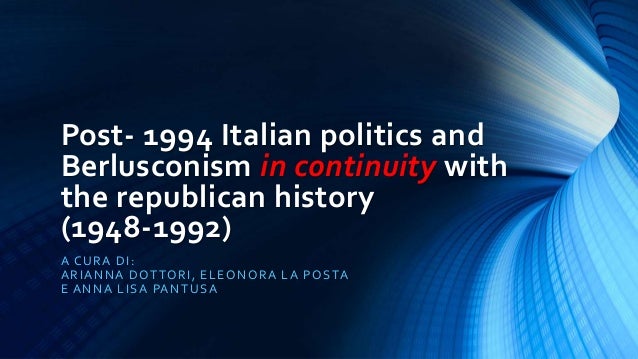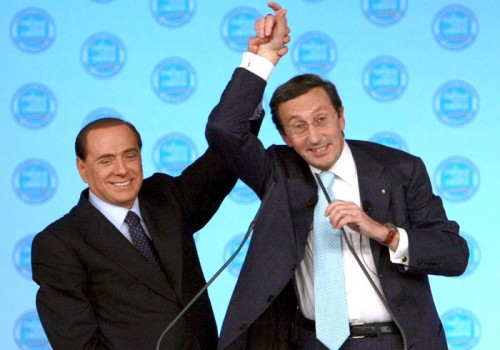Berlusconism
Berlusconism (it. berlusconismo ) is a neologism for a modern form of populism in the right to moderate the political spectrum in Italy. The foundation for this, the Italian politician and businessman Silvio Berlusconi in 1993, when he founded the Forza Italia party. The political and sociological significance of the phenomenon is as controversial as the question of a " Berlusconism without Silvio Berlusconi ".
Use and Discussion
The term takes on its journalistic use, a mostly critical intentioned use in the social and political sciences. In the description of the phenomenon scientists establish, inter alia, on to theses of the U.S. media theorist Neil Postman. This saw the judgment of citizens through entertainment industries such as television compromised and so feared an infantilization of society. The Italian political scientist Giovanni Sartori portrayed the Berlusconi as the court and the regime of a sultan.
The Italian Gian Enrico Rusconi political scientist turned against the simplification that Berlusconi had come as a " media mogul " to power and his media power, the Italians merely lead up the garden path. Rather, he characterized the Berlusconi as a policy that deals with the wider ambitions, ceiling in the center-right alliance organized circles. These political parties wanted to rid the world of the Cavaliere ' created things and not prepared themselves forward to the era after Berlusconi. The voters of Berlusconi are small, merchants, housewives, even simple workers who feel economically and socially disadvantaged and the Berlusconism turn, because it promises to change the status quo, new rules of the game, because the old are considered as a brake on the economy, a bureaucratic deregulation and greater local freedom of action. In this sense, the Berlusconi-ism is an expression of Italian, citizens or civil society ' and an expression of deep disappointment and perplexity of many citizens about the old policy or via the traditional party system from which the Berlusconi appears to them as a possible way out.
The journalist Susanna Bohemian Kuby saw in the Berlusconism a network of political and economic structures as well as a pattern of political action, which was also the Cabinet Prodi II and served as a " adapted from Berlusconi 's center-left " realized. It prevails in Italy so the Berlusconism regardless of whether Berlusconi is in power.
Avoid advocate of Berlusconism the name Berlusconism more and tend to identify a reversal in a Antiberlusconismus they as a - form of anti criticize liberalism - from their perspective. Berlusconi's movement sees itself as an expression of liberalism, however, the criticism marks the Berlusconi as an anti- liberal ideology. Criticism and polemics often culminated in a comparison of Berlusconi with Italian fascism under Mussolini. Experts refused to equate the Berlusconism with fascism, with reference to different historical and political contexts from course.
The debate on the Berlusconi touches a total of a number of topics, which generally deal with various forms of domination, here especially with the phenomena:
- Bonapartism
- Caesarism
- Fascism
- Liberalism
- Post-Democracy
- Erosion of the system of separation of powers
- Corruption and clientelism
- Mafia and Mafia-like mentality (it. mentalità mafiosa )
The Berlusconi is further discussed in terms of the political use of communication strategies and stands in connection with the terms
- Media democracy
- Mediocracy ( media domination )
- Media manipulation
Quotes
" The Berlusconismo as it presents itself today, is composed of the elements arrogance, ignorance, cunning together ( Furbizia ), arrogance, contradictions, aggressiveness, indifference, interest relatedness and unpredictability. (...) Silvio Berlusconi (...) has installed a confrontational culture in Italian politics. "
"How Fascism is the Berlusconism a dangerous evil, difficult to eradicate. "
"For me, Berlusconi is like part of the family. "
"Let me explain why hides a Communist in Cavaliere [ Silvio Berlusconi ]. "
" Berlusconi is the rediscovery of democratic populism and the creation of a media democracy, which aims to replace the traditional party democracy. (...) Mussolini's regime was institutionally anti-democratic dictatorship, were suppressed in the press and freedom of expression. The Berlusconism other hand, is obsessed with the consent of the voters outright, measure the pollsters every day and to be maintained by means of a medial hyper- communication. "
" The Berlusconi was a parody of neoliberalism. He raised many with the impression of a modernization and liberalization of economic and social life, but at the same time he also showed the most negative aspects of Italy 's political culture on: neglect, evasion of the law, complicity between private interests and public resources. The political opponents were portrayed as enemies of freedom, proponents of statism, 'Communists'. Nevertheless, the Berlusconi enjoyed under 'normal' conditions, a wide acceptance. Given the unexpectedly severe financial and economic crisis, the political class Berlusconi's goal proved powerless. "
Pair of terms Berlusconitization and Deberlusconisierung
The example of the intense media coverage in the " company car Affair " by Federal Health Minister Ulla Schmidt in the summer of 2009, the journalist Gustav Seibt presented under the heading " German Berlusconitization " in an article for the Süddeutsche Zeitung 2010 a propaganda by a " strange coalition of public opinion makers " fixed, " which extends from the left-liberal editorial about the Bild newspaper to Frank Plasberg " and " pursuing continuous subordination of the most trivial subject, " a grotesque " moral harassment ". "The combination of mood unbelangbarer power with politicians contempt" is - according to Seibt - " the mix on which the Berlusconitization the political operation [ in Germany ] imagine " going. About the Berlusconism Seibt then remarked: " Berlusconi offers the example of a depoliticized politics, in fact, the personal political motive ruled that the state is so degraded the environment of a business empire. "
In an article for the Spanish newspaper El País, the Italian writer Antonio Tabucchi called 2011 a " Deberlusconisierung Italy". Berlusconi, he accused is to have passed through his television and media empire Italians in the regime of a " Truman Show". Tabucchi contributed with his contribution to the spread of a political term that was particularly taken up in the fall of 2013 in connection with the vote of confidence of the government Letta.










